Urban Governance and Human Rights through Smart Cities
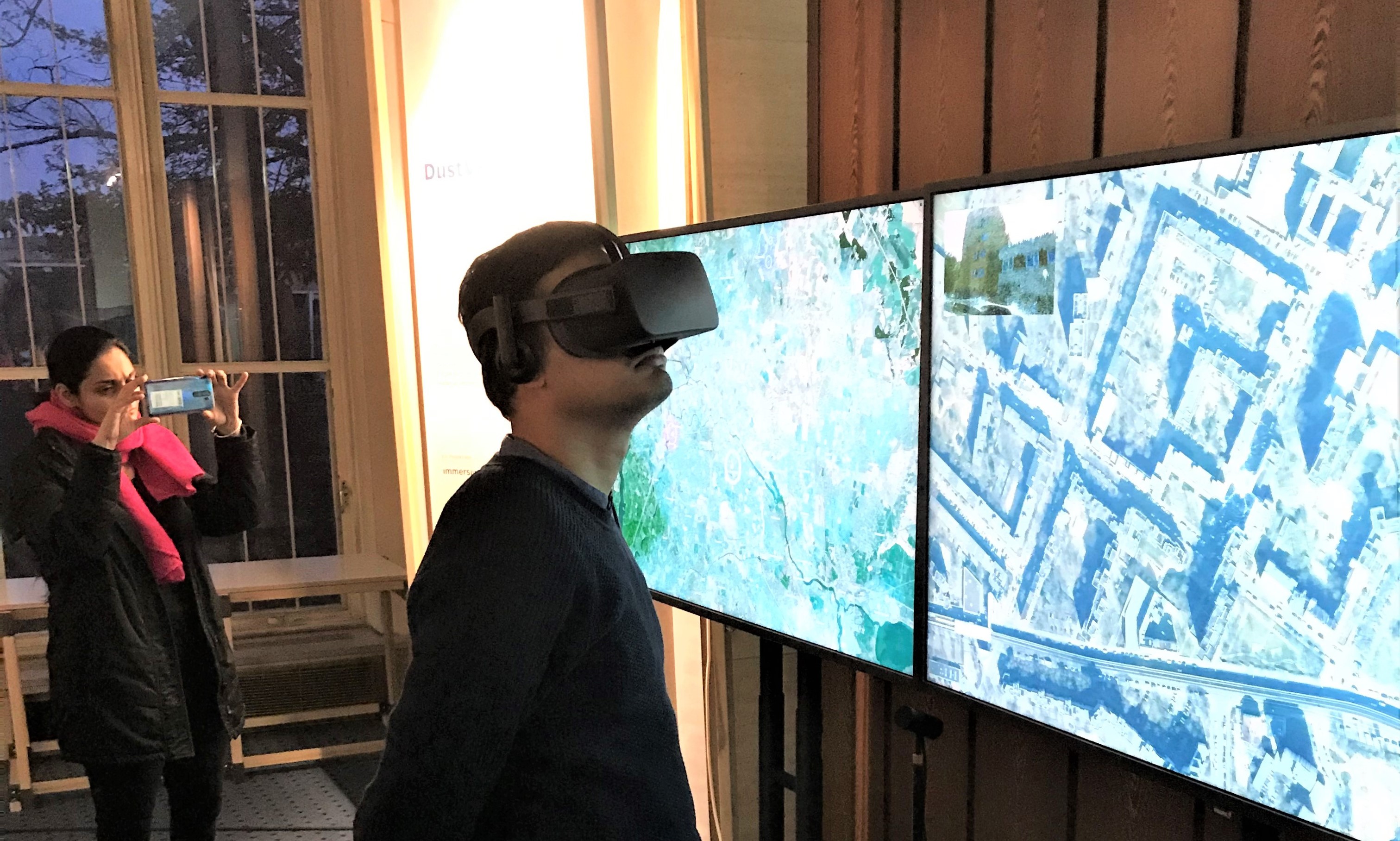
In February 2020, the International Visiting Programme of the IAF hosted a delegation of human rights activists, lawyers, urban planners and architects from Bangladesh, India, Nepal and Pakistan. The delegation met for an exchange on urban governance and human rights through smart cities.
The urbanisation in the region of South Asia has been massive in the last decades and the development will continue. It is estimated that Delhi will become the biggest city in the world in 2030 with about 39 million inhabitants. Mumbai and Dhaka, two other megacities in the region, are expected to grow rapidly as well. This enormous development creates a need for smart infrastructure and smart urban planning, since agglomerations of this size have numerous challenges when it comes to public services and liveability. Mumbai for instance is the city with one of the worst traffic congestion in the world. All of the megacities in the region have to fight high levels of air pollution and start to prepare for the consequences of climate change.
The immense social inequality in most of the region leads to substantially varying degrees of equality of opportunities and democratic participation. Most of the urban planning and architecture solutions to address the described developments are tech-driven and do not take human rights issues into account. Accordingly, one of the main objectives of the programme was to search for combined approaches and best practices prioritising human rights and a sustainable development on the federal, state and local level. Beyond that, the programme focused on the multi-stakeholder nature of building a smart city and the vital role the various groups play.
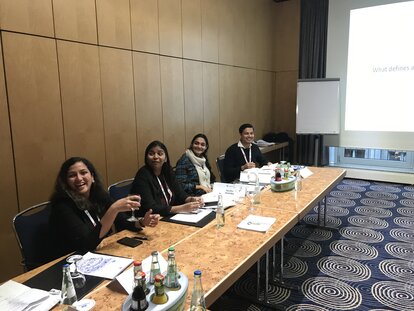
Delegates during a discussion break
Therefore, the delegation met with interlocutors from various organisations to discuss different views and approaches on smart cities. On the first day, Dirk Assmann, the advisor for urban innovation and urbanisation of the Liberal Institute of the Friedrich Naumann Foundation for Freedom (FNF), facilitated a workshop on the topics urbanisation, the concept of smart cities and their liberal approach. A lively discussion about the similarities and differences between the circumstances in the different South Asian countries and Germany ensued. Above, the term “smart city” was critically analysed and unfolded in its diverse meanings and focuses. Finally, Assmann presented the liberal smart city, which fosters a certain service orientation, enhances the freedom and democratic participation of its inhabitants, assigns a high value to data protection, promotes the creativity and ideas of the population and is understood as a constantly ongoing and adaptive process.
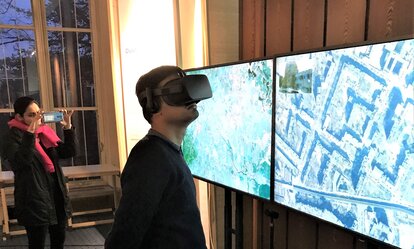
The virtual reality installation is the level of air pollution in Berlin (CityLAB Berlin)
After the workshop and the discussions, the participants were eager to get to know the smart city approaches in Berlin. The delegation went to see Berlin Partner GmbH for their first meeting to speak about the piecemeal concept of “Smart City Berlin” and innovative ways to foster cooperation between all stakeholders. The organisation is created as private public partnership and is supposed to foster economic activities and the emergence of innovative companies and technologies in Berlin. Afterwards the group met with GIZ to learn about projects working with ICT-based solutions for climate adaption and mitigation in South Asia. They presented a mobile application, which helps the storm water drain with the support of users, who report on flooding sewerage via the application. On the third day of the programme, the delegation was welcomed by Charles du Vinage, the head of the FNF Asia Desk, at the foundation’s headquarters in Potsdam, to become acquainted with the international work of the foundation and especially with the activities of the foundation in South Asia. Back in Berlin, the participants visited Thomas Eichhorn from the Smart City Hub Berlin. They discussed the German start-up scene and possibilities to bring different stakeholders together and foster cross-stakeholder cooperation to achieve suitable and versatile solutions. To have a more tangible and specific impression, the group was invited to the Tegel Projekt GmbH, which is planning a new utilization concept for the area of Berlin’s Tegel airport after its shutdown, when Berlin’s new airport BER is put into service. The interlocutors first presented the project and provoked a vivid discussion on the challenges of those projects and the possibilities to consider the needs of all stakeholders. Especially social inclusion and ecological aspects were debated. The last meeting of the day was at the CityLAB Berlin. The group was invited to visit the exhibition, in which creative approaches and solutions, developed by university students, scholars and activists for specific urban problems, were presented.
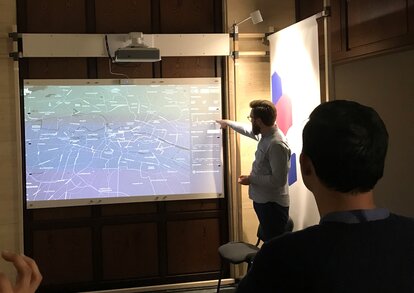
The presentation of an interactive map to visualize the data of rental bike usage in Berlin (CityLAB Berlin)
The following day, the participants met with the human rights advisor of the FNF, Michaela Lissowsky, in the capital office of the foundation, to discuss municipal structures of human rights work. The delegation continued the discussion with Dr. Jens Libbe of the German Institute for Urban Affairs about a more municipality-based perspective and smart urban development as a public task. He underlined the importance of the municipality in participation projects and the inclusion of vulnerable people. Then, the group met with Michael Herrscher, who is the Digital Agenda Advisor of the liberal party FDP. He highlighted the federal perspective on the topic of urban planning and revealed the essential role of digitalisation to most of the smart city approaches in Germany. Hereafter, the group went to the city of Darmstadt in the federal state of Hessen, which is close to Frankfurt am Main.
Why Darmstadt, you might ask? Besides visiting the German capital, the delegation should experience Darmstadt as city of science. It hosts 50.000 students, several universities, three institutes of the Frauenhofer community and, most famously, the European Space Operation Center. Within the project “Digitalstadt Darmstadt”, the city does develop digital blue print projects in the fields of traffic control, mobility and shared scientific data. After an inspiring city tour in the morning, the delegation went to meet Leif Blum, the Managing Director of the Hessonian parliamentary group of the FDP. The session started with the example of the digitalisation in Darmstadt and the federal state of Hessen. Interestingly enough, it developed into a broader, philosophical discourse about the effects of digitalisation and the implications for human rights and civil liberties. The programme was completed by two internal discussions, in which the participants exchanged their views and opinions on the programme as well as reflected the learnings and the impact on their work.
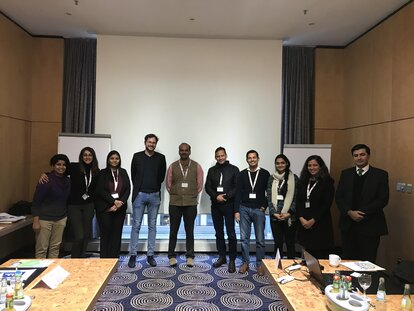
Dirk Assmann discussed a variety of smart city approaches with the delegation
The overall conclusion after the internal debates and the discussions with the interlocutors was that most smart city approaches lack the focus on human rights aspects, but are reduced rather to technical aspects. Therefore, to develop and foster a combined approach is necessary, especially in the region of South Asia, since it has big challenges regarding urban development and human rights issues. There is polarity between Germany and South Asia when it comes to inclusion of human rights in smart cities. While for instance South Asian countries are still fighting for equal access to internet for all, Germany is looking into the privacy aspect while using online services. The FNF offices in the region will continue the effort to support our partner organisations with tackling human rights issues and fighting for further improvements in the region.
Potsdam, 18 May 2020